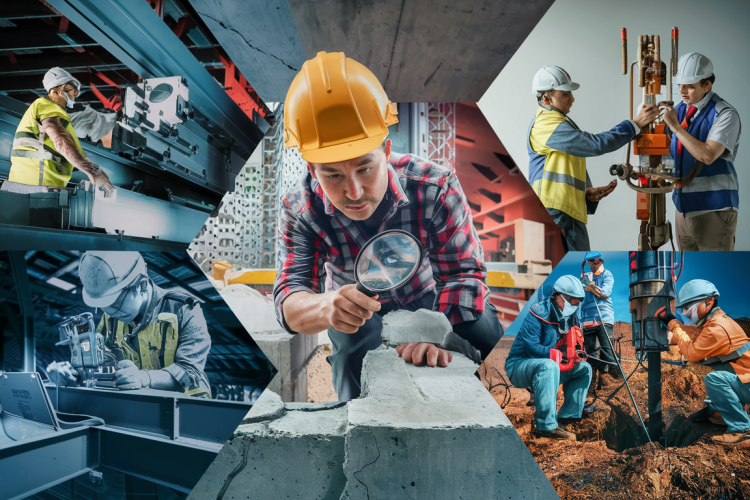
How Construction Testing Services Can Identify Costly Structural Damage: A Comprehensive Guide
Construction projects, whether large-scale infrastructure developments or residential buildings, require meticulous planning and execution to ensure structural integrity and safety. However, despite careful planning, structural damage can occur, leading to safety hazards and costly repairs. This article delves into the role of construction testing services in identifying such damage and preventing potential risks.
Understanding the importance of material testing
Material testing forms the cornerstone of construction quality control, enabling engineers and project managers to assess the properties and characteristics of various construction materials. Additionally, from concrete and asphalt to steel and timber, material testing helps ensure that the components used in construction meet specified standards for strength, durability, and safety.
Ensuring compliance with regulatory standards
One of the primary objectives of material testing is to ensure compliance with regulatory standards and industry specifications. Accredited Concrete Testing Lab (ACTL Testing) offers comprehensive material testing services, conducted by qualified technicians using state-of-the-art equipment.
Detecting structural deficiencies early on
Material testing can reveal hidden structural deficiencies that may compromise the integrity of a building or infrastructure project. By identifying these issues early in the construction process, contractors and developers can take corrective measures to address them before they escalate into costly problems.
The role of construction testing services
Non-destructive testing techniques
Non-destructive testing (NDT) techniques, such as ultrasonic testing and ground-penetrating radar, allow engineers to assess the condition of structures without causing damage. Additionally, these methods are particularly useful for detecting hidden defects and assessing the structural integrity of existing buildings and infrastructure.
On-site inspection and monitoring
On-site inspection and monitoring involve regular visits to construction sites to assess progress, identify potential hazards, and ensure compliance with project specifications. Additionally, construction testing services providers offer on-site testing and inspection services to verify the quality of materials and workmanship throughout the construction process.
How do construction testing services identify costly structural damage?
Construction testing services employ a variety of techniques and methodologies to identify costly structural damage and mitigate risks. By combining advanced testing procedures with expert analysis, these services help ensure the safety and longevity of construction projects.
Visual inspection and documentation
Visual inspection forms the basis of structural assessment, allowing inspectors to identify visible signs of damage, such as cracks, spalling, and corrosion. The documentation of findings provides a comprehensive record of the structure’s condition and serves as a reference for future inspections.
Laboratory testing of construction materials
Laboratory testing involves the analysis of construction materials, such as concrete, steel, and soil, to assess their properties and performance characteristics. These tests help identify material defects, weaknesses, and potential sources of deterioration that could compromise structural integrity over time.
Structural analysis and performance evaluation
Structural analysis involves using advanced engineering software and analytical techniques to assess the behavior and performance of buildings and infrastructure under various loading conditions. By simulating real-world scenarios, engineers can identify potential weaknesses and design flaws that may lead to costly structural damage.
Frequently asked questions
How often should construction testing services be performed?
Construction testing services should be performed regularly throughout the construction process, from the initial stages of material selection to the final inspection and quality control checks. Furthermore, regular testing helps identify issues early on and ensures compliance with regulatory standards.
What types of construction materials are commonly tested?
Construction materials commonly tested include concrete, asphalt, steel, timber, aggregates, and soils. Additionally, each material has unique properties and characteristics that must be evaluated to ensure compatibility, durability, and performance in construction applications.
How can construction testing services help prevent costly repairs?
By identifying structural deficiencies and material defects early on, construction testing services help prevent costly repairs and remediation work. Moreover, timely detection of issues allows for prompt corrective action, minimizing the risk of catastrophic failures and associated expenses.
Are construction testing services only necessary for new construction projects?
While construction material testing services are essential for new construction projects, they are also valuable for existing structures undergoing renovations, repairs, or maintenance. Testing helps assess the condition of aging infrastructure and identify areas requiring attention to ensure continued safety and functionality.
What qualifications should I look for in a construction testing services provider?
When selecting a construction testing service, look for accreditation, industry certifications, and a track record of excellence. Qualified technicians, state-of-the-art equipment, and adherence to regulatory standards are essential criteria for reliable testing and inspection services.
Conclusion
Construction testing services play a vital role in identifying costly structural damage and ensuring the safety and integrity of construction projects. Furthermore, by employing advanced testing techniques, expert analysis, and meticulous inspection procedures, these services help mitigate risks and prevent potentially catastrophic failures. For reliable and comprehensive construction testing services, trust the expertise of the Accredited Concrete Testing Lab (ACTL Testing) and ensure the success of your construction projects. As a Class 1 Concrete and Aggregate Testing laboratory, our distinguished credentials are authenticated by eminent institutions such as AASHTO and CCRL.





